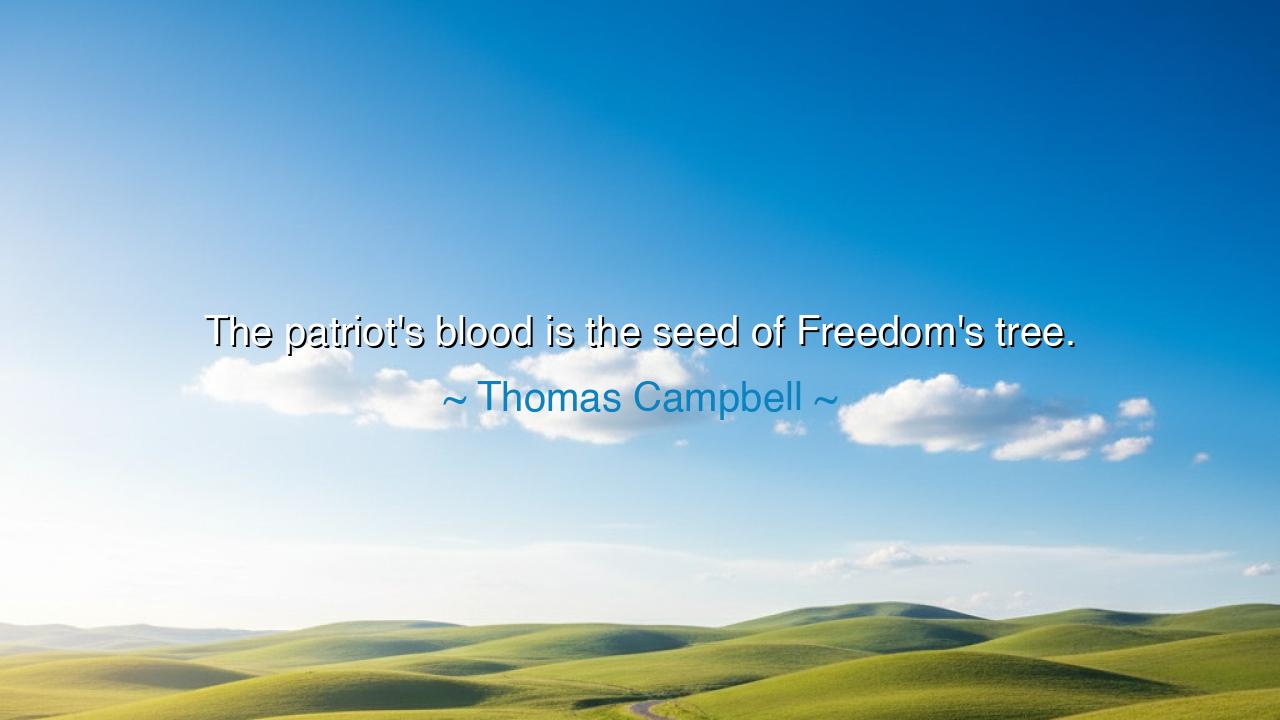
The patriot's blood is the seed of Freedom's tree.






“The patriot’s blood is the seed of Freedom’s tree.” Thus wrote Thomas Campbell, poet of Scotland, whose words echo with eternal solemnity. In this brief line, he condenses the tragic and noble truth of history: that freedom does not spring forth from ease, nor grow from comfort, but is watered by sacrifice. The patriot, who gives his blood willingly for the sake of liberty, becomes the seed from which nations flourish. His life may be cut down, but his sacrifice ensures that the tree of freedom takes root and rises, sheltering generations to come.
The meaning of this saying is profound and deeply evocative. Every liberty we enjoy—speech, worship, assembly, the simple dignity of living free—has been purchased at the cost of others’ suffering. The patriot’s blood is not wasted, for in falling it sanctifies the soil and plants within it the possibility of a brighter future. Campbell’s metaphor reminds us that sacrifice is not the end, but the beginning; every martyr for liberty sows the seed of a stronger, freer world.
We see this truth written in history’s pages. Recall the American Revolution, when men like Nathan Hale declared, “I only regret that I have but one life to lose for my country.” His blood, shed by the hangman’s noose, became one of countless seeds from which the United States was born. Or remember the fields of Gettysburg, where thousands fell; yet their sacrifice preserved the Union and gave birth to a new birth of freedom. Each drop of blood became nourishment for the tree of liberty, that it might stand unbroken in the storms of time.
Nor is this truth limited to America. In every land where tyranny has been overthrown, the pattern holds. The French Revolution, though flawed, sprang from the suffering of a people who refused to be slaves. In India, freedom came only after countless endured prison, beatings, and death in their stand against colonial rule. The patriot’s blood has watered many soils, and in every case, the harvest is the same: the blossoming of freedom, however long delayed.
Yet Campbell’s words also carry a weight of sorrow. For he reminds us that freedom is never free, and that the seed of liberty is costly. Too often, those who inherit it forget its price. They rest in the shade of the tree, never recalling the blood that made it grow. They quarrel over petty things, they neglect their duties, and they dishonor the memory of the patriots whose sacrifice gave them their inheritance. Campbell’s wisdom calls us back: to remember, to honor, and to live worthy of such a costly gift.
The lesson is clear: freedom cannot be preserved without sacrifice. Sometimes that sacrifice is blood, in war or persecution. At other times, it is the quieter sacrifice of service, vigilance, and devotion. Each generation must add its offering to the soil of liberty, lest the tree wither. We are not merely inheritors of freedom—we are stewards, called to guard it for the generations yet to come.
Practically, this means living with both gratitude and responsibility. Teach your children the stories of sacrifice, that they may know the cost of their liberty. Serve your community and your nation, not with complaint, but with devotion. Stand firm when injustice rises, for silence weakens the roots of freedom’s tree. And remember that though not all are called to give their blood, all are called to give something: time, effort, courage, or sacrifice, in defense of liberty.
So let Campbell’s words be etched into the hearts of all who hear them: “The patriot’s blood is the seed of Freedom’s tree.” Do not take lightly the shade beneath which you rest, for it was watered by sacrifice. Honor it with your life, defend it with your strength, and pass it on unbroken, that the tree of liberty may stand tall through all the ages of man.






AAdministratorAdministrator
Welcome, honored guests. Please leave a comment, we will respond soon